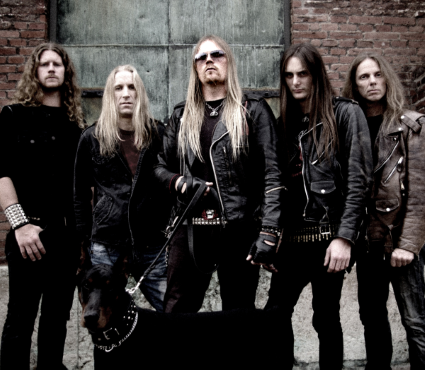
Album Review: RAM - "Death"
RAM is a band that clings to the belief that heavy metal has been a misguided, wayward genre since the early 1980’s, drifting away from its homeland on unnecessarily blood-soaked tides.
RAM’s third studio album, named simply “Death,” is an album that is very late to heavy metal’s party. It is dressed to the nines in acid wash denim, crunchy guitar hooks, studded jackets and simple, refined beats. To glance at the band’s idiomatic lettering and cover art is to jump into the WABAC machine and gaze at metal’s past come to pulsating life.
“Death” is a headbanger’s love letter to the forgone days of metal, when hair was stringy and (largely) unwashed, Converse high-tops were dominating the basketball shoe market, and ‘metal’ was a distinctly two-syllable word (which naturally, had to be pronounced in your best Bobby Blitz imitation: “MMME-TAHL.”)
Now, if RAM is truly a band in the mold of Judas Priest, it bears noting that there were an awful lot of generic bands from that era that did not survive the fickle shifting sands of time. Saxon, Tygers of Pan Tang, Diamond Head, AngelWitchExciterFistCancerWitchfynde…need I go on? That said, RAM learns from a lot of those bands’ mistakes, and has conjured an album that is borne from old sensibilities, but doesn’t fall victim to blind nostalgia. (This is as opposed to the latest Steel Panther claptrap.) The songs are virile and sincere, trying to resurrect an era rather than simply remember it.
Despite their Swedish origin, RAM bubbles over with the kind of British riffing and toe-tapping gallop pacing that so is so inseparable from the New Wave of British Heavy Metal. Both of the album’s singles, “Defiant” and “I am the End” bounce along in that characteristic way that makes people bop their head and sing along.

The album’s greatest strength is its reliance on capable axe-man Daniel Johansson. The second half of the album comes alive with his virtuosity and ability to play a frenetic solo that remains firmly in the pocket of the band’s paradigm. His effortless scaling on “Under the Scythe” and “Flame of the Tyrants” are two of the album’s highlight reel worthy moments.
More than that Johansson (and the rest of RAM) have an inside-and-out understanding of the music they’re trying to make. There are no moments or songs that are out of place, and the music feels comfortable, especially as it lapses into the catchy hooks of “…Comes From the Mouth Beyond.”
As with most things though, there are pitfalls here. “Death” is best when it keeps things short and switches away from full-auto to three-round bursts. The album’s longer pieces, “Frozen” and “Hypnos” really get lost in themselves, in that same exact way that Maiden’s “Children of the Damned” didn’t really fly. Also, the album’s sworn fealty to the days of metal’s beginning limits the scope of the material. There are no new horizons explored, no modern interpretations of past ideas, nothing outside the closed-in envelope of heavy metal between 1978 and 1985. “Death” and RAM do not wallow in nostalgia or wistfully remember the theoretical “good old days,” but they are at the same time musically captive within them.
We’ve seen this kind of loving tribute before. Darkthrone’s “Circle the Wagons” was also a carefully crafted testament to the early days of modern metal, although that album focused more on crust punk and pure speed. RAM’s “Death,” by comparison concentrates on trying to replicate the clean and simple but intelligent feeling of some of metal’s biggest names from that era, Judas Priest and Iron Maiden. If those criteria are to be used to judge this effort, then “Death” is a smashing success. It’s punchy and forceful without having to be overbearing, which is a nice change of pace. However, if you have an ear for only the most modern of modern heavy metal, you will hate “Death.” The irony is, the members of RAM are fine with that. They didn’t make this album for you, anyway.

